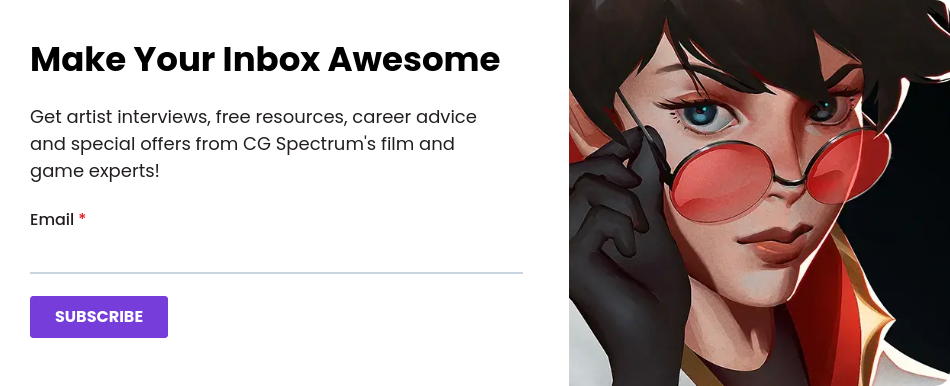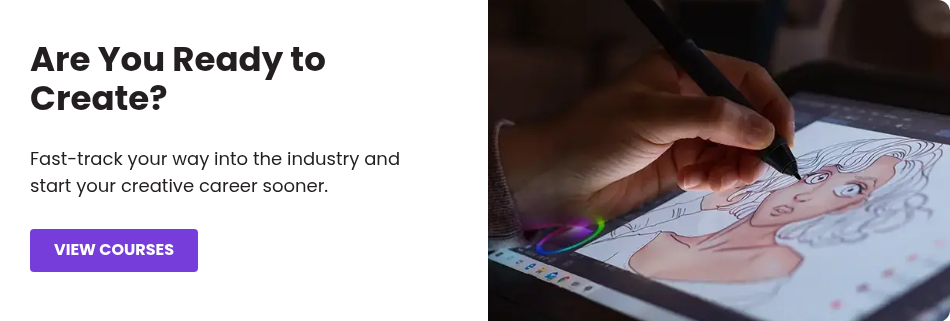This month we're featuring our talented Game Development and Design and Unreal Engine Technical Assistants Oliver Rotter and Heinrich Bisschoff.
If you're new to CG Spectrum and haven't met this duo of awesome, they're here to support you throughout your studies, give inspiration, and ensure you get the most out of your time with us!
Hi Oliver and Heinrich! Tell us about your journey into game development and design. What made you want to study it?
OR: Since I was a kid I have loved games and game theory. Fantasy-themed tabletop and video games especially caught my interest. I remember how I created my own tabletop game for a school project, which I was as a young boy very proud of. As I grew older, I played various video games, usually very competitive, with a great interest in understanding game mechanics and systems. That's where I joined some very passionate communities in regards to theory crafting and game modeling.
I always was fascinated by game design and the complexity of game development, but for a long time didn't really think about giving it a shot as a career option, just as a hobby to pursue. After working in different fields, the latest programming, I decided in 2020 to pursue a career in game development. After thorough research, I made the decision to enroll in CG Spectrum.
 HB: Well it has been a dream of mine since i was a little kid, some of my first memories are sitting with my sister and imagining the games we could make. Fast forward a couple of years and I was at university for computer sciences and in the labs there was this little program called Unreal Engine and, well, here I am.
HB: Well it has been a dream of mine since i was a little kid, some of my first memories are sitting with my sister and imagining the games we could make. Fast forward a couple of years and I was at university for computer sciences and in the labs there was this little program called Unreal Engine and, well, here I am.
Can you walk us briefly through your creative process and what inspires you?
HB: My creative process tends to be very free flowing especially when it comes to Level Design. I have learned to create documentation and that definitely has a place and is important but I tend to start with real world examples and then try to bring the world or system to life by telling stories within each room or small area.
OR: When it comes to my creative process, I am always looking out for inspiration in the world. Gathering references, researching methods and technology, or exchanging ideas and concepts with other people is part of my process when tackling a project. In general, I am a big fan of the iterative design process. Creating something from an idea to a finished product takes a lot of steps. Game development projects especially entail a lot of different technical and creative steps which interlink with each other on different levels.
For me it is always important to have a clear concept and plan, breaking things down into small conceptual chunks, to create a good overview of needs to be done. -OR
One big part of that is bringing ideas and concepts from head to paper and defining them.
Can you share your favorite piece of work right now and tell us about it?
OR: I recently did a relighting of my first Unreal Engine project for CG Spectrum, the Hunter's Mountain Cabin project. The project started as part of a smaller learning project to familiarize myself with Unreal Engine 4
Over a few weeks it grew into a larger project, and over the term, with the help of my mentor Scot Bayless, it evolved into a portfolio project for level design.
 See how Oliver created his Hunter's Mountain Cabin scene in Unreal Engine
See how Oliver created his Hunter's Mountain Cabin scene in Unreal Engine

A few months later, I revisited the project with the goal of relighting it and I managed to give the scene a whole new look with the help of mentor William Faucher.
 See more creations in Oliver's portfolio.
See more creations in Oliver's portfolio.
HB: My favorite recent piece of work is a map I created for the Mount and Blade Bannerlord Mod team called Kingdoms of Arda.
 Work by Heinrich Bisschoff
Work by Heinrich Bisschoff
It is a huge Lord of the Rings total conversion mod and I’m a huge LOTR fan so this project is a dream come true.
The map is called the Lamedon Foothills. The area is based on Northern Italy and the map was made in the Bannerlord Mod tools.

It took me a few months as every rock (over 300!) was painstakingly placed to form rock formations.

How did you find CG Spectrum and what has your experience been like so far?
HB: Professor Google helped me!
During my time at CG Spectrum I have found my passion, and the skills I’ve learned are beyond anything I could’ve imagined would be possible in such a short time. -HB
OR: Through having some good and bad experiences with local as well as online learning institutes, my priority was to find a school where I could get hands-on industry knowledge and have a personal mentor to accompany me on my journey. I searched the internet for online distance learning schools for game design and found a lot of good reviews for CG Spectrum, which led me to look into it more.
After nearly a year of studying at CG Spectrum, I can say that it was the right choice for me. The weekly calls with my mentor Scot Bayless especially have proven to be worth the investment. On top of that I met a lot of fantastic fellow students and made good friends.

What does your role as Technical Assistant involve, and what do you most enjoy about it?
OR: My main job as Game Design Technical Assistant is to help students with their questions on game design and Unreal Engine. Helping students to solve a problem and helping them grow is a pleasure to me. Each month I host a Student Meetup where students can present and share their work. For example, we had one student showing his indie game studio and the game prototype he is currently developing. On top of that, I am currently working on the game design challenges which the game design TA team and Lead Game Design Mentor Daniel Pinch will start with this month. I am excited to see what our students will make out of them.
HB: As a TA my job is to help make and facilitate the new challenges we are launching as well as help other students and mentors with any problems or questions they have. That is honestly what I enjoy doing the most.
Tell us about the challenges you will be running for students. How are these designed to help students improve as game designers?
HB: I believe the challenges will play a major role in assisting students to gauge their own work against other students', and help them identify their strengths and weaknesses.
Being an online school it’s easy to feel isolated and just focus on your own work. These challenges create interaction between students and give them exposure to practical industry examples such as design tests.
OR: The challenges help students develop an industry workflow, with tasks to be completed within a certain time frame. Game Design Mentor Daniel Pinch and three TAs will help the students on their journey. Every week we will have Feedback Fridays, where we will go over the work and help the students iterate their work, just like in a professional studio.
What do you think makes the CG Spectrum community so special? How can students make the most out of it?
OR: Like-minded passionate people who love their craft. It is great to have a community of students who give it their all to pursue their dream careers and to learn new skills.
The mentors are as passionate about their craft as the students are eager to learn from them. -OR
In the last few months, the opportunities to grow as a student at CG Spectrum have improved a lot. There are weekly open sessions for different departments for all students to join and learn directly from mentors, as well as assistance from the TAs. From my experience, CG Spectrum offers ample opportunities to learn and grow.
HB: The community consists of students and mentors and everyone is extremely friendly and helpful.
I would recommend students reach out to other mentors in the community for feedback and participate as much as they can. -HB
What creative strengths have CG Spectrum helped you with the most?
OR: I am always striving to do my best and get the most out of my work. Game development projects involve a lot due to their complexity. That's where it is important to have a good sense of the scope of projects and the intricacy the project entails. I learned a lot through my study at CG Spectrum and the weekly Q&A calls with my mentor Scot Bayless who has years of experience in game development and project management.
HB: That I should follow my instincts more and that has really boosted my confidence in my skills.
Where is your own career headed? Where can we learn more about you and see your work?
OR: I am happy to announce that I am starting at 707 GAMES Studios at Novomatic as a game designer and technical project coordinator. Apart from that, I continue to work on personal projects. For regular updates on these you can find me on LinkedIn or Artstation. I am currently working on a stylized fantasy project. It is still in the early stages, but I already have a clear concept in mind.
HB: I will be graduating in December and then the job hunt begins. As long as I can keep making games I will be happy. My LinkedIn would be the best place to learn all about my work.
Do you have any advice for current and potential students who might be interested in our Game Development courses?
Just start! Download Unreal Engine or Unity, mess around and start making games. Once you start you won’t ever want to stop! -HB
OR: When I was beginning my journey I was scared of what I didn't know and how much I wanted to learn. But I knew I had to start somewhere, taking one step at a time.
The wonderful thing with CG Spectrum is that you have a mentor who guides you and walks with you at each step of the process. -OR
Someone who walked the path before you and knows what lies ahead. That's why I can only recommend taking action, take the first step, then keep going until you reach your goal. It is doable.
Want to join an inspiring and supportive community of creators?
One of the benefits of studying at CG Spectrum is becoming part of a vibrant and supportive community of peers and mentors who are actively working in the film and games industry. Our unique online community offers an abundance of additional value through regular webinars, career development sessions, networking opportunities, weekly challenges and so much more! Explore our game development courses and we look forward to welcoming you to the CGS community.

Related Links




